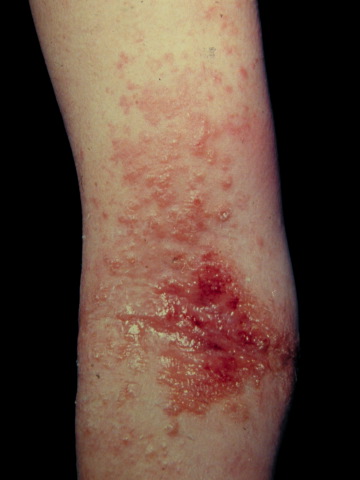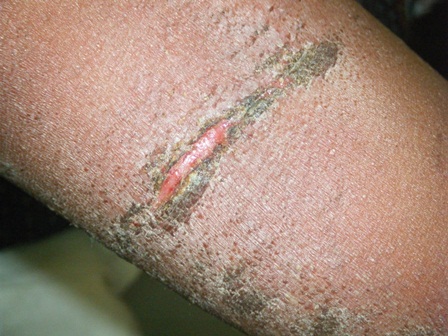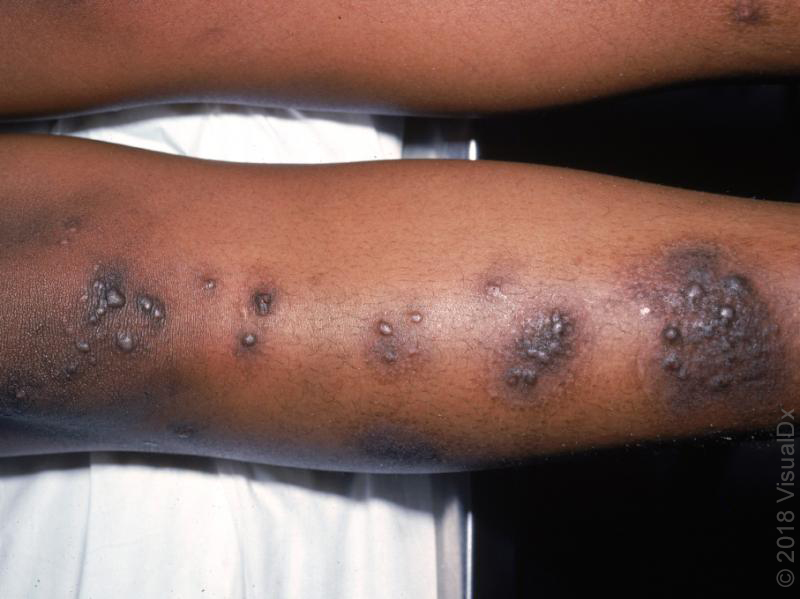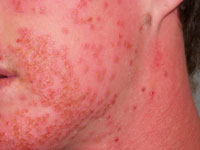Welcome to the infections section!
Having dry and broken skin can leave your skin more likely to get skin infections. This section includes photos of people with eczema.
It will look at:
- Why are people with eczema more likely to get skin infections?
- What does infected eczema look like?
- What does eczema herpeticum look like?
- What about general infections and eczema?
Why are people with eczema more likely to get skin infection?
Everyone has bacteria on their skin. People with eczema are likely to have more bacteria on their skin that can cause skin infections.
This is because many people with eczema have dry skin. Dry skin is a good place for some bacteria to live in. Cracks, breaks, or scratches in the skin can also make the bacteria more likely to cause infection.
These bacteria grow more on eczema that is not under control. If you tend to get infections, the best way to avoid them is by controlling your eczema using flare control creams. You should also use moisturising creams regularly throughout the day.
Top tip!
Bacteria can build up in tubs of moisturising creams. You can avoid this by using a pump dispenser. But if your moisturising cream comes in a tub you can scoop it out with a spoon, rather than using your hands.
What does infected eczema look like?
Infected eczema will be more sore than usual. In lighter skin, infected eczema may look more red than usual. In darker skin, it may look more grey, purple, or brown than usual.
It will start to weep and form yellow crusts. Sometimes you can see white or yellow blisters, or pus-spots under the skin.

More images of infected eczema


Research has found that most infected eczema can be treated with a flare control cream.
Find out why using flare control creams is better than using antibiotics
A research study led by the University of Cardiff (called the CREAM study) looked at whether or not antibiotics help children with infected eczema. 113 children with infected eczema took part in the study.
The study results found that giving antibiotics did not make a difference to infected eczema. The infections of the children who used flare control creams cleared up just as well. The children in the study did not have severely infected eczema and antibiotics will still be necessary for some people.
What should I do if my eczema is infected?
You should see your doctor if:
- the infection is spreading or oozing
- the infection is painful
- You have a fever or are unwell
If you do not have these symptoms, then you can treat it by putting on flare control cream. You can put flare control creams on broken skin. It may sting a bit, but it will not cause any harm.
Infections are more likely to happen on eczema that is not under control and they often go away when inflamed skin is treated properly.
After trying flare control cream, you should see your doctor if the symptoms are:
- Getting worse
- Not getting better after 5 days
Keeping the eczema as well controlled as possible can help prevent eczema becoming infected.
You can do this by using moisturising creams and flare control creams.
Can a virus cause skin infections?Some infections are caused by a virus such as chickenpox, molluscum, warts and measles. These infections are not more common in people with eczema although warts and molluscum can last longer if you have eczema. This is because eczema can stop the body’s defence system from getting rid of the virus. Cold sores can sometimes cause a serious infection in people with eczema, called eczema herpeticum. The next section will explain more about this condition. |
What is eczema herpeticum?
Eczema herpeticum is caused by the cold sore virus and can be very serious. People with eczema may get normal cold sores around their lips. In rare situations, the virus can go a bit wild in people with eczema and infect larger areas of the skin.
This is usually easy for people to spot because they:
- are very uncomfortable or sore to touch
- may have a high temperature
- has tiny blisters or punched out little circles of skin that is spreading quickly.
There are other conditions which cause blistering which are not serious. It can be difficult to tell the difference. If you are not sure then see your GP or go to the hospital the same day so you can start treatment for the virus as soon as possible.
Picture of eczema herpeticum

What about other infections and eczema?
There is no evidence to suggest that any particular infection, like flu or chickenpox, will make your eczema worse or better.
Generally, eczema treatment can be carried on as normal during an infection. Chickenpox can be made worse by flare control creams so it is best not to use them until no new spots appear.
